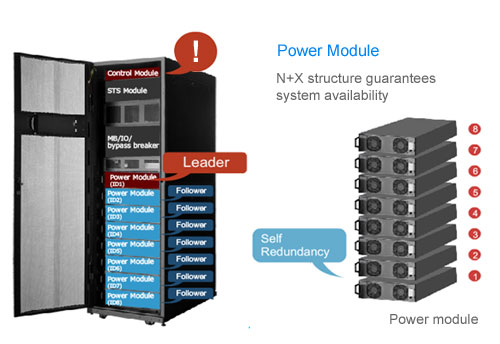A datacenter is crucial to the daily operations of many organizations. The cost of downtime due to critical load failure is expensive and could run between USD4,000 to USD6,000 per minute or even more. Using uninterruptible power supplies (UPS) is the key to sustaining the operation continuity of a datacenter. To achieve the highest availability possible for a datacenter, it is vital that the UPS is equipped with fault-tolerant capability and fail-safe design for assured system reliability. It is also important for the UPS to offer the flexibility of different configurations for the sake of redundancy and to further enhance overall power availability.
Modular UPSs provide a good demonstration of the ultimate fault tolerant UPS capability. For example, the Delta Modulon DPH series has a fully fault-tolerant design that provides self-redundancy of its power modules. In addition, full control logic allows the system to self-synchronize in the event of main module failure and automatically switch to the backup for assured continuous operation.

Second, the hot-swappable functionality of critical components and modules improves the serviceability of the UPS system, thereby reducing the MTTR to close to zero to assure maximum uptime and ultimate availability for the datacenter. A quick replacement using the standard operating procedure (SOP) for modules can help save 50% or more on repair time than traditional standalone UPSs.
Design for reliability is the basic feature of all UPSs. Fail-safe design is a further step taken to eliminating single-point failure and ensuring reliability. In other words, it's the “insurance” aspect of the UPS. Most of Delta's UPSs are equipped with fail-safe designs in the areas of auxiliary power, control mechanism, and more.
Auxiliary power is the main power system for UPS system control, and it is at the heart of the UPS. The failure of aux power is a potential single point failure and could stop the operation of the UPS and cause downtime of the datacenter. Delta UPSs are designed with redundant aux power. When the mains fail, the backup aux power continues to supply power to the control system to ensure the non-stop operation of the UPS.
DSP control is widely adopted in UPS design due to its advantages in component reduction to lower the failure rate and increase system reliability. On the other hand, the failure of DSP control is another risk for single-point failure. Delta's fail-safe design can detect the failure of a control mechanism and automatically switch the UPS to bypass mode to sustain a continuous power supply to critical loads so as to realize higher system reliability.
When mentioning availability, the flexibility of different UPS system design configurations is also important. Delta UPSs allow several possibilities of redundancy design.
1. Parallel configuration (N+1), no additional hardware required
2. Hot-standby configuration achieved by dual power input design, providing system redundancy and quality power at the same time
3. System plus system configuration (2N, 2N+1) achieved by synchronized multiple bus, meeting TIA-942 tier 4 reliability for mission critical datacenter applications.
The Delta UPS Ultron and Modulon series assure exceptional reliability and maximize uptime to deliver the high availability that contributes to best-in-class practices and reduces Total Cost of Ownership (TCO).